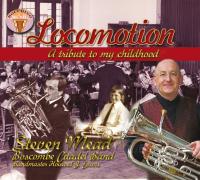Locomotion review by Peter Bale
Review from www.4barsrest.com by Peter Bale - Locomotion
Going on a nostalgia trip can be a bit of a risky enterprise, and sometimes returning to the scene of past successes and happy memories can prove a bit of an anticlimax, as several top-class footballers have found to their cost. Fortunately for the record-buying public, Steven Mead's visit to Boscombe, where he grew up within the fellowship of the Salvation Army corps and began his playing career - initially on a cornet! - is rather more of a success, bringing a combination of Salvation Army repertoire, old and new, with a couple of other secular items.
Written for Derick Kane in 1995, Norman Bearcroft's "Locomotion", the title track for the cd, is based on the old spiritual "This train is bound for glory", complete with train effects at times, and opening chords that make you think the redskins are lurking behind the next ridge! After a contemplative introduction the train sets off in earnest, giving the soloist full rein, particularly in the upper register, with considerable interplay between soloist and band. The slow central section offers the opportunity for some finely controlled, sustained playing, not to mention several lip trills. The final section incorporates the gospel song "Welcome, welcome home", where the band has the opportunity for some carefully-placed bell effects before the train reaches its destination.
"On Alderley Edge" is one of the most listener-friendly test pieces of recent years, and Peter Graham has extracted one of the main themes to create an effective solo in "The Holy Well". The soloist takes full advantage of the use of rubato to emphasise the shape of the melodic line, and there is some delicate work in the accompaniment, especially in the important phrases in the basses.
Staying with Peter Graham, he arranged Carl Hohne's "Slavische Fantasie" for xylophonist Evelyn Glennie and the Black Dyke Band. It sits equally comfortably on the euphonium - at least it does in the hands of a player as adept as Steven Mead! - with the cadenzas sounding as if they had always been intended to be played on brass. The Slavonic character of the music is retained, as phrases are carefully pointed and one never loses track of the melody underlying the variations.
Howard Evans, a former National Bandmaster and until the end of December the bandmaster of the Amsterdam Staff Band, has a number of compositions to his credit, including several choral items. His setting of the words of the children's hymn "When he cometh" was premiered at the Royal Albert Hall in 1989 and later formed part of his band piece "Elegaic Variations". The solo version presented here was especially prepared for the recording, although it was also featured by the Amsterdam Staff Band during their recent tour of the UK.
David Chaulk is a notable trombonist as well as a euphonium player, and is currently the Principal Trombone of the Wellington Sinfonia and Musical Director of the Pelorus Trust Wellington Brass. He featured "Variants on St Francis" with the Canadian Staff Band and it has been taken up by a number of others, on both euphonium and baritone. With its combination of running phrases and exquisite central section the soloist has ample opportunity to show both technical ability and musicianship.
Another arrangement made for Derick Kane follows in the form of Richard Phillips' impressive setting of "There will be God". Paying due attention to the heroic aspects of the music as well as the more contemplative side, and with a sweeping run up to the final top "F" this is one of the highlights of the disc.
"Banjo and Fiddle", originally written for violin and piano, has been arranged by Swiss euphonium star Thomas Ruedi, giving both soloist and band some challenges to overcome. In contrast, "Deep inside the Sacred Temple" (in Keith Wilkinson's sympathetic arrangement) calls for lyrical playing and an empathetic relationship between the duettists. Although Steven has recently duetted with his father Rex, for much of his life a tenor horn player, but who has played euphonium for the past ten years, on this occasion he plays both parts himself with his customary smoothness and subtlety.
Norman Audoire's "We'll all shout hallelujah" dates from 1945 and was the first solo Steven played with Boscombe Band. In fairly traditional theme and variations style it has stood the test of time better than some, and does not seem out of place amongst the other more elaborate offerings here.
Ivor Bosanko is not particularly noted as a writer for the euphonium, although there are telling moments in many of his band pieces, not least in "His provision" which has probably produced a few palpitations in Sunday night meetings.
"My unchanging friend" sets the familiar tune "Yesterday, today, forever, Jesus is the same", together with the composer's own setting of the words "I want dear lord, a heart that's pure and clean". With the euphonium's first entry coming at the top of the register, it calls for great control and, as Steven points out in the excellent sleeve notes, it deserves to be more widely used. It is also an item with contrasting dynamics, and these are observed faithfully, with the soloist still coming across well even when the band is at full strength.
Steven has had particular success in recent years with his multi-tracked recordings, and there is a break from the full band sound in the form of American Gail Robertson's five-part arrangement of "A quiet place". This predominantly gentle piece makes for a fitting prelude to William Himes's major work "Journey into peace". Written in the 1970s and based around Edward Joy's devotional song "All your anxiety" it portrays the soloist's journey through various trials and tribulations, culminating in serenity with the realisation that all these things must be left in God's hands. It is in effect a tone poem for euphonium and band, and is often scored extremely sparsely, placing great demands on the band with which Boscombe cope very well.
The recording is well presented, with copious notes, a listing of band personnel and a photographic montage featuring Steven at three stages of his career. The band provide Steven with excellent support, and are much more impressive than in their recent recording of marches, possibly in no little part due to the allocation of more rehearsal and studio time. There are a couple of occasions where the cornets in particular sound a little strained, and the occasional tutti interlude may be a little exuberant for some tastes, but in general they respond well to the demands of the music and the direction of their bandmaster.
As for the planning of the programme, it could be thought to be a little brave, if not foolhardy, to end on a quiet note, but for this listener the sequence of the final three pieces works beautifully, with "Journey into peace" proving a fitting climax, both musically and emotionally. Steven's playing is to his usual high standard, always giving the music room to breathe, and maintaining the musicality regardless of any pyrotechnics that may be on the copy.
- Peter Bale

Steven Mead with the Boscombe Citadel Band, Bandmaster: Howard J. Evans

